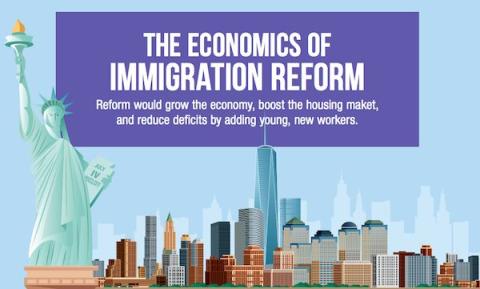At the heart of the ongoing immigration reform debate is the question of the anticipated costs and benefits of reform. Assessing the impact of various reform proposals on economic growth, wages, and federal and state budgets is critical to making an informed judgment as to whether enactment of reform is in the best interests of the country.
Effective immigration reform can be a powerful instrument of economic revitalization. By increasing the overall population and particularly the number of working-age labor force participants, reform can help expand the economy, contribute to higher overall average wages, generate more consumer spending, and spur new demand for residential housing construction. By supporting stronger economic growth, immigration reform can also reduce the federal budget deficit substantially.

